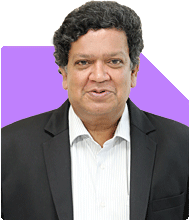Can Homeopathic Medicine Treat My Gallbladder Stones?
Dr Hemalata Arora | Answer |Ask -Follow
General Physician - Answered on Jun 21, 2024
In a career spanning over 24 years, she has focused on managing infectious diseases, critical illnesses and lifestyle disorders.
Dr Arora completed her MBBS and MD from the King Edward Memorial Hospital and Seth Gordhandas Sunderdas Medical College in Mumbai.
She is ECFMG certified, accredited by the American Board of Internal Medicine, Diplomate of the National Board and a DNB faculty.
She was honoured with the Paul Bunn award for her promising performance in the field of infectious diseases at SUNY Upstate Medical University, New York.... more

I have stones in my gall bladder.I have visited many doctors and they all recommend to go through the operation,as it's the best remedy.My parents refuses to believe it because as per them there are a lot of homeopathic medicines that can remove my stones and told me not to get my operation done.So,should I trust the homeopathic medicines or should I get my operation done??
You may like to see similar questions and answers below
Dr Karthiyayini Mahadevan | Answer |Ask -Follow
General Physician - Answered on Apr 28, 2023
Dr Ashit Hegde | Answer |Ask -Follow
Consultant Physician, Internal Medicine and Critical Care Expert - Answered on Sep 27, 2023
Dr Karthiyayini Mahadevan | Answer |Ask -Follow
General Physician - Answered on Aug 05, 2024
Dr Dipankar Dutta |1836 Answers |Ask -Follow
Tech Careers and Skill Development Expert - Answered on Dec 05, 2025
Ulhas Joshi |280 Answers |Ask -Follow
Mutual Fund Expert - Answered on Dec 05, 2025
Dr Dipankar Dutta |1836 Answers |Ask -Follow
Tech Careers and Skill Development Expert - Answered on Dec 04, 2025
Ravi Mittal |676 Answers |Ask -Follow
Dating, Relationships Expert - Answered on Dec 04, 2025
Anu Krishna |1745 Answers |Ask -Follow
Relationships Expert, Mind Coach - Answered on Dec 04, 2025
Anu Krishna |1745 Answers |Ask -Follow
Relationships Expert, Mind Coach - Answered on Dec 04, 2025
Mayank Chandel |2562 Answers |Ask -Follow
IIT-JEE, NEET-UG, SAT, CLAT, CA, CS Exam Expert - Answered on Dec 04, 2025
Mayank Chandel |2562 Answers |Ask -Follow
IIT-JEE, NEET-UG, SAT, CLAT, CA, CS Exam Expert - Answered on Dec 04, 2025
Mayank Chandel |2562 Answers |Ask -Follow
IIT-JEE, NEET-UG, SAT, CLAT, CA, CS Exam Expert - Answered on Dec 04, 2025
Mayank Chandel |2562 Answers |Ask -Follow
IIT-JEE, NEET-UG, SAT, CLAT, CA, CS Exam Expert - Answered on Dec 04, 2025


























